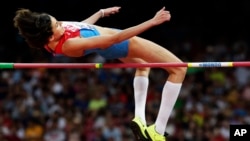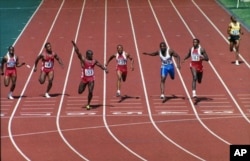A series of doping scandals plaguing world athletics has fueled a debate about whether international sports bodies should do more to combat doping or legalize it.
A World Anti-Doping Agency (WADA) report released last month accused Russia of running a state-sponsored doping program in track and field - an accusation that prompted the International Association of Athletics Federations (IAAF) to suspend Russian athletes from global competition.
Kenya also has faced allegations of widespread doping since August, when European news outlets ARD and the Sunday Times published IAAF data of suspicious blood samples from medal-winning athletes - many of them Kenyans.
Justifying a crackdown
Some commentators on sports ethics say these scandals show a need for the international community to keep up the fight against doping.
"One of the great problems with doping is that it makes every athlete's performance questionable," said Scott Douglas, senior content editor for Runner's World magazine, on this week's Hashtag VOA TV program.
Another panelist in the program, Washington-based international sport lawyer David Larkin, said doping turns genuine competition into a "charade."
"When you look at the IAAF doping test samples released by ARD and the Sunday Times, they raise questions about [potential doping by] one-third of the medalists in competition [between 2001 and 2012]," said Larkin.
He said doping on such a large scale prompts fans to ask, "if this really is not valid competition based on merit, do I really want to spend my time [watching it]?"
In a separate interview with VOA, Douglas said international scrutiny of doping problems in Kenya and other nations is improving the situation.
Kenya's athletics federation suspended seven athletes for doping offenses last week, bringing the total number of suspended Kenyan athletes to 40 over the past three years. WADA officials have warned Kenya to clean up its act or face sanctions.
"The Kenyans felt pressure to do something about doping," said Douglas. "If there were enough pressure placed on other countries, they might do the same."
Speaking on Hashtag VOA, Douglas said the U.S. Anti-Doping Agency (USADA), which is fully compliant with WADA guidelines, has found an effective way to prevent doping by notifying American athletes of mandatory tests via Twitter.
He said the athletes often reply with messages such as: "thanks, USADA for waking me up at 6am today for my urine test. I'm happy to participate in clean sport."
The case for legalization
Sports ethics commentator Ellis Cashmore told Hashtag VOA the world's anti-doping agencies will never catch all athletes who are determined to cheat. He said doping instead should be legalized for everyone.
"Anti-doping authorities always are going to be behind the curve, because there are doping methods and drugs that they don't have names for," said Cashmore, a sociology professor at Britain's Aston University. "They don't know which athletes are using the drugs, where those athletes get them from, and what kinds of dosages are being taken."
Cashmore also said global anti-doping efforts have achieved little since 1988, when Canadian sprinter Ben Johnson was stripped of his 100 meter Olympic gold medal for taking a banned steroid.
"I can remember the declaration of war on doping immediately after the event," he said. "Here we are in the third decade after that, and the problem is more pronounced and widespread today than it was in the 1980s."
Cashmore said the persistence of doping also has not stopped sports fans from watching the Olympics to this day.
"If we just tap them on the shoulder and say, 'hey, most of this [Olympic sport] was actually affected by doping in some way,' I don't think that they would retrospectively turn around and say 'oh well, we didn't enjoy it after all.'"
In separate comments to VOA, Cashmore said legalized doping also would encourage athletes to disclose their use of performance-enhancing drugs to authorities, who could help those athletes to take the drugs in safe dosages and reduce dangers to health.
Douglas, the Runner's World editor, said he opposes legalization primarily because of the impact it would have on the next generation of athletes. "It would be easy to tell everyone preparing for 2016 Olympics, 'go ahead and dope'. But what about kids looking ahead to the 2020 and 2024 games - do we want to encourage them to dope?" he asked.
"I would say keep the faith, and don't give up the hope for clean competition," Douglas told Hashtag VOA.

















